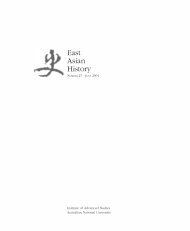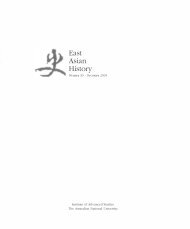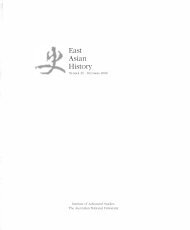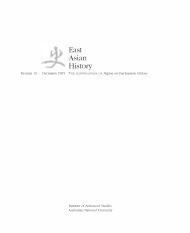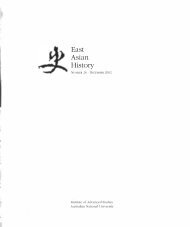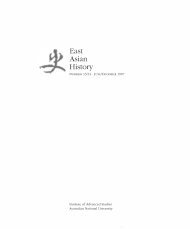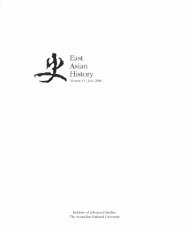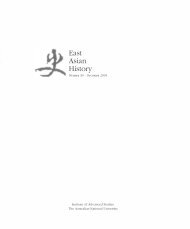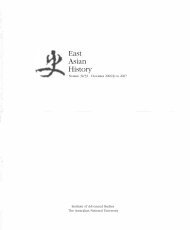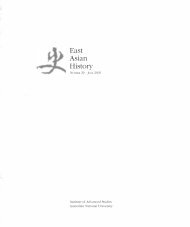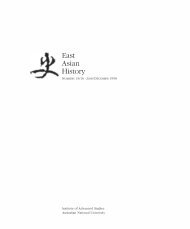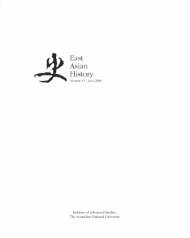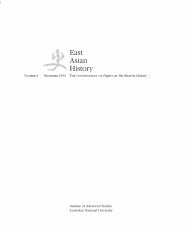Observations from a Film - (Miriam Lang) (PDF ... - East Asian History
Observations from a Film - (Miriam Lang) (PDF ... - East Asian History
Observations from a Film - (Miriam Lang) (PDF ... - East Asian History
- No tags were found...
You also want an ePaper? Increase the reach of your titles
YUMPU automatically turns print PDFs into web optimized ePapers that Google loves.
TRADITIONAL MUSICIANS IN CONTEMPORARY CHINA165As noted above, the self-conscious use of 'Chinese flavour' in compositionsis still a feature of young composers in China now, who borrow melodicshapes and timbres <strong>from</strong> traditional music and characteristic techniques <strong>from</strong>Chinese instruments. 54The closing scene of Swan Song also illustrates the importance of being'qualified' in order to be able to act convincingly in the Chinese musicworld. Music <strong>from</strong> an unknown composer like Ou Laoshu is ignored, butthe same music is acclaimed if it is thought to come <strong>from</strong> He Dasha (as OuLaoshu obviously realizes when he finally submits his work for publicationunder He's name, knowing that under his own it will never be accepted).Likewise, when Ou Laoshu's themes have been reworked and modernizedby a young musician who is the daughter of a prominent opera star, aconservatory-trained Western musician and so promising a talent that hergraduating concert is televised, the music world responds with accolades.The importance of reputation and connections is a constant feature ofChinese life. In the 1989 survey, one respondent cited the lack of anestablished reputation and a well-known name as a hindrance to achievingambitions; wishing to write a historical and theoretical textbook on Chinesetraditional instrumental music, this person knew that there was no hope ofbeing able to do such a thing, since a young, unknown writer was notqualified to be listened to.Another issue highlighted in the closing scenes of Swan Song is the classdifference between Guanzai, the representative of the private businessworld, and his half-sister, the conservatory intellectual. Class differences havenot been a major topic in post -Mao films, but here they are made very clearindeed. The young pianist has all of the prestige of tertiary education as wellas an obviously privileged upbringing, whereas Guanzai is in a SOCiallymarginal occupation and, contrary to the popular image of private businesspeople, works extremely hard but has achieved only modest financialsuccess. 55Ou Laoshu could himself be said to be a peripheral member of the eliteclass. He does not have tertiary education but he displays some of thetrappings of an intellectual; he notates his compositions in elaboratelywritten scores rather than relying on oral transmission, uses a ratherclassicalized form of Chinese in his personal correspondence, and owns anexpensive and high-status 'gentleman's' musical instrument. 56 By virtue ofthis and his government-sponsored job, he can claim marginal membershipof the intellectual class-but he comes nonetheless <strong>from</strong> a dubious socialbackground, and his personal life is distinctly questionable. Ou Laoshu doesnot really belong comfortably in any social category. His past life and hisnostalgia for it prevent him <strong>from</strong> fitting into New China as represented by hiswork unit. Class differences set him apart <strong>from</strong> the local amateur musiciansand his former wife. He cannot be numbered along with his old cronies, thedead musical geniuses, because he is not a recognized talent. Ou cannot/programs" (Charles Harrun, "Music and radioin the People's Republic of China: Journalof the Society for <strong>Asian</strong> Music 22.2 (Spring!Summer 1991): 1-42, at 15. Kraus points outthat the range of Western music favoured bythe Chinese is quite narrowly defined;"Mozart. Beethoven and Schubert. alsoBraluns and such eastern Europeans asTchaikovsky and Chopin ... the Chineseaccept as Western classical music the symphonicwarhorses of the nineteenth centuryand ... the romantic literature for piano." Henotes that baroque and renaissance music.twentieth-century composers such as Stravinskyor Bartok, Western opera, chambermusic and religious music are not popular inChina (Kraus, Pianos and politics, p.8).54 See article on Tan Dun cited above (n.20).55 A 1988 survey of private business peoplein Chengdu. Sichuan. reveals that "Thesocial position of private business peoplestill ranks lowest in city life. and this isespeciaUy felt by young people wanting tomake a career for themselves ... the artractiveincome <strong>from</strong> business aUeviates this.but ... many of the young feel they arebeing looked down upon, they are nottrusted by aU and ... their choice of marriagepartners is limited: Ole Bruun, Thereappearance of the fa mily as an economicunit: a sample suroey of individual householdsin workshop production and crafts,Chengdu, Sichuan Province, China. CopenhagenDiscussion Papers. no. 1 (Copenhagen:Center for <strong>East</strong> and Southeast <strong>Asian</strong> Studies.Dec. 1988), p.1l9. The author goes on toobserve that for young people in Chinathere is a clear and self-conscious choicebetween prestige (with a governmentassignedjob) and independence and possiblywealth (in private business). Swan Songdiffers <strong>from</strong> many other modem Chinesefilms in that it clearly portrays the statusdistinctions between inteUectuals and privatebusiness people.56 Zhongguo yinyue shiliie suggests that,like Ou Laoshu, the real historical Cantonesecomposers came <strong>from</strong> humble origins butpossessed high levels of technical skill andeducation (p.383).



